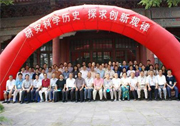| 中文题目: | 赵元任1926—1937年在方言调查中使用的收音与声学装置——感官、客观性、观察 | ||||||
| 英文题目: | Mechanization of Hearing in Chao Yuen Ren’s Dialect Research, 1927–1936: Senses, Objectivity, and Observation | ||||||
| 作 者: | 杨振邦 | ||||||
| 刊物名称: | Chinese Annals of History of Science and Technology | ||||||
| 发表年度: | 2019 | ||||||
| 卷: | 3 | ||||||
| 期: | 2 | ||||||
| 页码: | 94–117 | ||||||
| 中文摘要: |
当科学研究于20世纪初在中国发轫时,关键问题之一是如何经由客观精确的观察取得可靠的经验数据信息。本文通过具体的个案探究当时如何处理客观性的经验观察这一问题,聚焦于语言学家赵元任在其语音研究中使用的机器装置。赵元任于20世纪二三十年代在华中与华南地区进行了一系列包含田野及实验室记音的方言调查。有别于传统音韵学家完全依赖人耳辨音与韵书的方法,赵元任利用机械仪器印刻并分析各种方言声调的频谱,且使用留声机记录受访者的发音。赵元任使用的机械装置不只提供新的观测工具,更改变了对中国音韵学的一些基本范畴(如声调)的理解。此外,赵元任并不试图以机器取代观测者在经验研究中的地位。相反地,这些机械装置对研究者的个人特质有新的要求。
|
||||||
| 英文摘要: |
When scientific research began in early twentieth-century China, a key issue was the acquisition of reliable empirical information through objective and precise observations. This article examines a specific case where a scientist grappled with such an issue: the linguist Chao Yuen Ren’s application of mechanical means in his phonetic studies. In the 1920s–1930s, Chao conducted a series of field and lab studies on the dialects in southern and central China. In contrast to traditional scholars’ exclusive reliance on sharp ears and rhyme books, Chao employed mechanical devices to inscribe and analyze the spectrographs of dialectical tones and used phonographs to record the articulations of his subjects. It is demonstrated that Chao’s machines not only provided a new method of observation; they also altered the theoretical understanding of certain fundamental categories in Chinese phonology, such as tones. Moreover, Chao did not aim to replace human perception with automatic mechanisms in empirical investigations. Rather, the use of machines in his research called for an active and engaged scientific persona.
|
||||||





